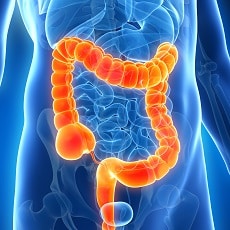4 Ways to Keep Your Colon Healthy
by: Madison Getz
Let’s talk about the colon. The colon is important to overall good health and a properly working digestive system. Most people don’t think about their colon unless they start noticing a problem. March is Colorectal Cancer Awareness Month, so we’re going to look at common diseases affecting the colon and four great ways to keep your colon healthy.
What does the colon do?
The colon is the final step of digestion. As food waste makes its way from the stomach, it travels through the small intestine, which absorbs nutrients that the stomach couldn’t. Then it arrives to the colon. Making its way through the six sections of the colon, food has the water and electrolytes removed. After this happens the colon removes the waste from the body (Very Well Health).

The Colon from https://medlineplus.gov/colonicdiseases.html
What diseases can affect the colon?
Colonic Polyps
Colonic polyps or colon polyps are extra pieces of tissue that grow inside the colon. While most polyps are non-life threatening, some may become cancerous. When these polyps are found, doctors will remove them and test for cancer. Polyps are found during a colonoscopy, a type of screening where doctors can see inside the colon with a tiny camera, called a scope. Polyps are more common for people over the age of 50, those who have had polyps before, those with a family history of polyps or colorectal cancer. Symptoms are rare, but can include the ones listed below (Medicine Plus).
Colonic Polyps Symptoms
Blood on underwear or toilet paper after a bowel movement
Blood in stool
Constipation or diarrhea lasting over a week
Ulcerative Colitis
Another disease of the colon is ulcerative colitis. This is a disease that causes inflammation and sores in the colon and rectum linings. These sores are often called ulcers. Most people start experiencing the symptoms of ulcerative colitis between the ages of 15 and 30. One risk factor is a family history of the disease.
Ulcerative Colitis Symptoms
Pain in the abdomen
Blood or pus in stool
Anemia, a lack of healthy red blood cells
Severe tiredness
Weight loss
Loss of appetite
Bleeding from the rectum
Sores on the skin
Joint pain
Growth failure in children
This disease is often diagnosed using stool tests, blood tests, imaging and colonoscopy. Treatment options depend on seriousness of the condition. It can be controlled using medicine and in severe cases, the colon can be removed (Medicine Plus).
Diverticular disease
Diverticulosis is a condition where small pouches bulge out through the colon. It is more common in people over the age of 60. While it does not have symptoms, a person may experience mild cramps, bloating and constipation. Medical professionals believe that diverticulosis is caused by diets low in fiber. When the pouches become inflamed or infected, the condition becomes diverticulitis, a more serious condition.
Diverticulitis Symptoms
Abdominal pain, usually on the left side
Fever
Nausea
Vomiting
Chills
Cramping
Constipation
In serious cases, diverticulitis can cause internal bleeding, blockages and tears in the colon. Treatment for mild cases includes antibiotics, pain relievers and a liquid diet. More severe cases may be treated through surgery (Medicine Plus).
Colorectal Cancer
The biggest disease affecting the colon is colorectal cancer. This happens when tumors grow in the lining of the colon, or large intestine. The risk of colorectal cancer is often higher once a person reaches the age of 50. Other risk factors include colorectal polyps, a family history of the disease, ulcerative colitis or Crohn’s diseases. Some risk factors can be controlled, such as high-fat diets and smoking.
Colorectal Cancer Symptoms:
Diarrhea or constipation
A feeling that your bowel does not empty completely
Blood in your stool
Stools that are narrower than usual
Frequent gas pains or cramps, feeling full or bloated
Sudden weight loss
Extreme tiredness
Nausea or vomiting
Sometimes a person may not experience symptoms at first. That is why it is important to get regular screenings. Screenings include a colonoscopy and tests for blood in stool. Treatments vary depending on the seriousness of the disease. Surgery, chemotherapy, radiation or any combination of these are treatment options for colorectal cancer (Medicine Plus).
4 Ways to Keep Your Colon Healthy
Get Screened Regularly
The best way to stay healthy is by regularly seeing your provider. Testing is a great way to prevent colon cancer and other diseases. Being able to catch a disease in the early stages makes it more treatable. A person should start regular screenings around age 50. If there is a family history of colon cancer and diseases, that person may want to start earlier and do screenings more routinely.
There are a few different ways to get screened. One way is the Fecal Occult Blood Test (FOBT)/Fecal Immunochemical Test (FIT). This test looks for blood in the stool, which can be a sign of cancer or other colon diseases. This test needs to be done once a year and can be done at home. Another screening type is a colonoscopy. This is a screening where the doctor can examine the entire colon using a tiny camera or scope. Any polyps or unusual growths found in the colon can be removed during the test. A colonoscopy only needs to be done every ten years. Similarly, a flexible sigmoidoscopy exam only looks at the lower part of the colon with a scope. This test needs to be done every five years (Siteman Cancer Center).

Fecal Occult Blood Test from https://kuow.org/stories/home-colon-cancer-screenings-remove-some-ick-factor/
Eat Healthy and Exercise Often
Being overweight is a risk factor for most diseases, but especially for diseases of the colon. Diets high in fiber and low in fats are the best for the colon. It can be as simple as eating less red meat and eating more proteins like beans, chicken and fish. Exercising for at least thirty minutes each day is the best way to lower the risk of colon cancer by 24% (Cone Health).
Quitting Bad Habits
Habits such as smoking and excessive alcohol use always affect the body in a negative way. The best thing to do to lower the risk of colon cancer is to quit smoking and limit alcoholic drinks. If you have trouble quitting, speak to your provider about possible solutions (Siteman Cancer Center).
Start taking Vitamins
Vitamins are often found in daily foods. However, taking vitamin supplements, or vitamin pills, can make sure that a person is getting enough vitamins to keep the body healthy. Certain vitamins help protect against colon cancer. Having about 1,000 milligrams(mg) of calcium and vitamin D is a great way to have a healthy colon. Multivitamins can also help the body against diseases. A multivitamin that has folate in it can reduce the risk of colon cancer (Siteman Cancer Center).
These four tips can help lower the risk of colon cancer and colon diseases. The best way to manage your risk factors is by talking to your provider about your concerns. Make an appointment by calling AxessPointe today at 888-975-9188. For more information on AxessPointe visit axesspointe.org.
Resources
Wilikinson BSN, RN, Julie. (2019, Nov. 26). The Function of the Colon. Retrieved February 26, 2020 from https://www.verywellhealth.com/what-is-the-colon-796819
MedlinePlus. (2020, Jan. 28). Colonic Diseases. Retrieved February 26, 2020 from https://medlineplus.gov/colonicdiseases.html
Siteman Cancer Center. (n.d.). 8 Ways to Prevent Colon Cancer. Retrieved February 26, 2020 from https://siteman.wustl.edu/prevention/take-proactive-control/8-ways-to-prevent-colon-cancer/
Cone Health. (2018, Mar. 5). 6 Ways to Keep Your Colon Healthy and Cancer-Free. Retrieved February 26, 2020 from https://www.conehealth.com/services/cancer-care/6-ways-to-keep-your-colon-healthy-and-cancer-free/


